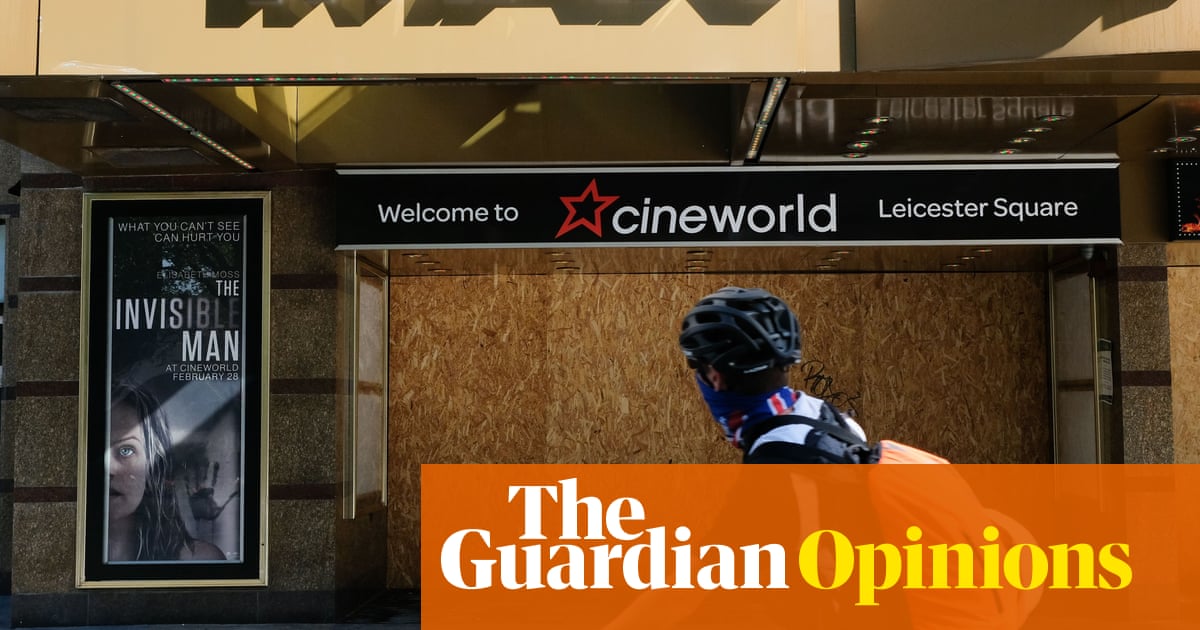
Ever since the first cinemas were built, film has been the great egalitarian art form. Wealthy people went, the middle classes didn’t sniff, but you could also take a date if you weren’t rich and wanted a night out. Film’s cultural function is intimately allied to price. If it wasn’t cheap, its power would diminish. This is one of the things that drew me and many others to it: going to the movies is for everyone.
That’s over. Maybe not quite yet, maybe not entirely, but it’s hard to foresee a future in which film-going as we know it doesn’t become an elite experience. Poorer people will be priced out because the best way to insulate yourself from risk is with distance. And – as with houses or airplanes or iClouds – space is expensive.
Cinemas in England will reopen on Saturday, and chains have been eager to reassure customers of the safety measures they’re taking: staggered screenings, one-way loo queues, staff in masks, deep cleaning each evening involving an “antiviral fogging machine” – all completely sufficient, according to government guidance.
Even so, strangers will still be sitting, faces uncovered, 1 metre apart, in an enclosed space for a couple of hours. Perhaps this will be fine. Perhaps not. People aren’t always on their very best behaviour at the movies. Did a couple chatting in the next row used to irritate you? Imagine how you might feel if they coughed as well. In the past, people have been shot dead for texting during the trailers. Nerves post-lockdown are likely to be yet more frayed. Complain at your peril.
So will multiplex cinema-going become the preserve of the young and the blithe, people for whom a rowdy crowd isn’t a deal breaker? Only if they’re rich, too. Antiviral fogging machines don’t come cheap, and to mitigate these costs, as well as the losses that come from reduced capacity and increased staffing, chains will need to up their prices. And if that means a fall in trade, they’ll have to adapt their premises, probably by chopping them up.
The sole sort of film-going likely to survive is the sort of upscale experience already offered by high-end arthouses. If you have £40 to spend on a ticket, you can likely buy yourself enough seclusion and security to diminish the risk of stray particulates. Less luxurious solutions will pop up, such as outdoor screenings (which are a bit weather-dependent) and drive-ins (tricky in cities or on your bike).
But one way or another, traditional cinema exhibition is doomed. And this, of course, will impact the sort of movies studios make. Nothing big-budget or risky will be green-lit unless it has a substantial, guaranteed small-screen audience.
If this prediction is correct, it will make for a sad final reel for cinemas. But not, necessarily, for cinema. Rather, it may offer an opportunity for film to embrace a new form of egalitarianism – or, perhaps, to return to it. When people started making movies, the contemporary industry we’ve been embedded in wasn’t necessarily the ideal they had in mind. Directors today are, by and large, beholden to backers, studios, distributors, exhibitors and a huge host of other interests to get their film in front of people.
Happily, it doesn’t have to be this way. There’s never been a better time for movies to divorce from the world of commerce. Making a film was democratised by tech advances a decade back; all that remained were the traditional gatekeepers blocking the path to distribution. As they collapse, new channels will emerge: Vimeo with better curation; TikTok with crowdfunding add-ons. Audience appetite for original, user-generated content is sky-high, as testified by YouTube’s mushrooming viewership during the pandemic.
New formats will be popularised. The usual two-hour running time for a film is based on the idea it’s an evening out. If everyone is in, no such restrictions apply. New talent will triumph, unfettered by previous prejudice. New currencies of appreciation – micropayments, subscriptions, likes – will materialise as cinema emerges from under the thumb of big business. These may be more edifying all round. They will allow audiences and filmmakers to feel they’re not being exploited by people with an eye on profit rather than plot.
There will be much to miss if many cinemas are eventually shuttered. But maybe there’s also a lot to be excited about, too, if the doors to the closed shop of the film industry are abruptly blown wide open.
• Catherine Shoard is the Guardian’s film editor
• This article was amended on 29 June 2020. It is only cinemas in England that reopen on Saturday, not in the UK as a previous version said.
June 29, 2020 at 04:49PM
https://ift.tt/3dL8BjU
After coronavirus, cinema may never be the same again - The Guardian
https://ift.tt/2ARZhNE
Bagikan Berita Ini

















0 Response to "After coronavirus, cinema may never be the same again - The Guardian"
Post a Comment